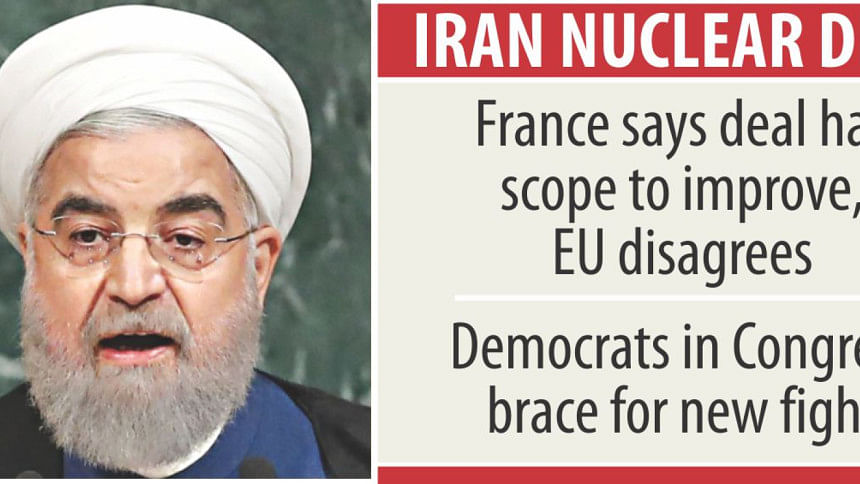Clouds hover over accord

Iran's President Hassan Rouhani yesterday said its nuclear accord with world powers cannot be renegotiated, after the Trump administration warned it was weighing whether the deal signed by its predecessor served US security interests.
"They were told clearly and definitively (by us) that the nuclear deal cannot be renegotiated," Rouhani told a press conference in Tehran broadcast live on state television after his return from the UN General Assembly.
Washington and Tehran's top diplomats confronted each other for the first time Wednesday as envoys scrambled to save the Iran nuclear deal from a skeptical Donald Trump.
US Secretary of State Rex Tillerson and Iranian Foreign Minister Mohammad Javad Zarif met as signatories to the 2015 accord at an EU-hosted event on the sidelines of the UN General Assembly.
Tillerson said the discussion had been a political one and that even if Iran is in "technical" compliance with the pact, "significant differences" remain.
Trump has denounced the agreement as an "embarrassment" to the United States and has accused Iran of breaking it in "spirit" by arming militant groups and destabilizing the Middle East.
In particular, he objects to the "sunset clause" that would see Iran resume some enrichment from 2025.
Tillerson argued that the preamble to the agreement implied that it would lead to a more stable Middle East and said Iran remains a source of instability.
European diplomats, while sharing those concerns, are becoming exasperated by the argument -- insisting the accord was designed solely to stop Iran getting the bomb.
"There is no need to renegotiate parts of the agreement because the agreement is concerning a nuclear program and as such is delivering," EU foreign policy chief Federica Mogherinisaid.
There was some sympathy for the US position from France, whose President Emmanuel Macron said the deal could be expanded to ban missile tests and cut the sunset clause. But even he insisted that the core deal not be dumped and the Joint Comprehensive Plan of Action that the deal signatories implemented last year must stay in place.
Trump is due to report to the US Congress on October 15 on whether or not he believes that Iran is in compliance with the nuclear deal. If, as now appears increasingly likely, he decides that it is not, it could open the way for renewed US sanctions and perhaps the collapse of the agreement.
Trump said Wednesday he had made his decision but was not yet ready to reveal it.
Iranian Supreme Leader Ayatollah Ali Khamenei, the highest authority in the Islamic Republic, also criticised Trump during a meeting yesterday with the Assembly of Experts, a body tasked with choosing the next Supreme Leader.
"This speech was not a sign of power but rather a sign of anger, frustration and stupidity," Khamenei said, according to a report on his official website.

 For all latest news, follow The Daily Star's Google News channel.
For all latest news, follow The Daily Star's Google News channel. 




Comments